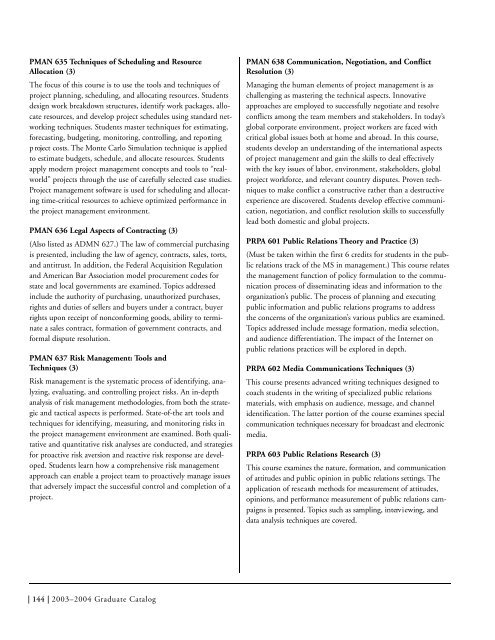A+B. Intro_SJ.1 - University of Maryland University College
A+B. Intro_SJ.1 - University of Maryland University College
A+B. Intro_SJ.1 - University of Maryland University College
Create successful ePaper yourself
Turn your PDF publications into a flip-book with our unique Google optimized e-Paper software.
PMAN 635 Techniques <strong>of</strong> Scheduling and Resource<br />
Allocation (3)<br />
The focus <strong>of</strong> this course is to use the tools and techniques <strong>of</strong><br />
project planning, scheduling, and allocating resources. Students<br />
design work breakdown structures, identify work packages, allocate<br />
resources, and develop project schedules using standard networking<br />
techniques. Students master techniques for estimating,<br />
forecasting, budgeting, monitoring, controlling, and re p o rt i n g<br />
p roject costs. The Monte Carlo Simulation technique is applied<br />
to estimate budgets, schedule, and allocate resources. Students<br />
apply modern project management concepts and tools to “realworld”<br />
projects through the use <strong>of</strong> carefully selected case studies.<br />
Project management s<strong>of</strong>tware is used for scheduling and allocating<br />
time-critical resources to achieve optimized performance in<br />
the project management environment.<br />
PMAN 636 Legal Aspects <strong>of</strong> Contracting (3)<br />
(Also listed as ADMN 627.) The law <strong>of</strong> commercial purchasing<br />
is presented, including the law <strong>of</strong> agency, contracts, sales, torts,<br />
and antitrust. In addition, the Federal Acquisition Regulation<br />
and American Bar Association model procurement codes for<br />
state and local governments are examined. Topics addressed<br />
include the authority <strong>of</strong> purchasing, unauthorized purchases,<br />
rights and duties <strong>of</strong> sellers and buyers under a contract, buyer<br />
rights upon receipt <strong>of</strong> nonconforming goods, ability to terminate<br />
a sales contract, formation <strong>of</strong> government contracts, and<br />
formal dispute resolution.<br />
PMAN 637 Risk Management: Tools and<br />
Techniques (3)<br />
Risk management is the systematic process <strong>of</strong> identifying, analyzing,<br />
evaluating, and controlling project risks. An in-depth<br />
analysis <strong>of</strong> risk management methodologies, from both the strategic<br />
and tactical aspects is performed. State-<strong>of</strong>-the art tools and<br />
techniques for identifying, measuring, and monitoring risks in<br />
the project management environment are examined. Both qualitative<br />
and quantitative risk analyses are conducted, and strategies<br />
for proactive risk aversion and reactive risk response are developed.<br />
Students learn how a comprehensive risk management<br />
approach can enable a project team to proactively manage issues<br />
that adversely impact the successful control and completion <strong>of</strong> a<br />
project.<br />
PMAN 638 Communication, Negotiation, and Conflict<br />
Resolution (3)<br />
Managing the human elements <strong>of</strong> project management is as<br />
challenging as mastering the technical aspects. Innovative<br />
approaches are employed to successfully negotiate and resolve<br />
conflicts among the team members and stakeholders. In today’s<br />
global corporate environment, project workers are faced with<br />
critical global issues both at home and abroad. In this course,<br />
students develop an understanding <strong>of</strong> the international aspects<br />
<strong>of</strong> project management and gain the skills to deal effectively<br />
with the key issues <strong>of</strong> labor, environment, stakeholders, global<br />
project workforce, and relevant country disputes. Proven techniques<br />
to make conflict a constructive rather than a destructive<br />
experience are discovered. Students develop effective communication,<br />
negotiation, and conflict resolution skills to successfully<br />
lead both domestic and global projects.<br />
PRPA 601 Public Relations Theory and Practice (3)<br />
(Must be taken within the first 6 credits for students in the public<br />
relations track <strong>of</strong> the MS in management.) This course relates<br />
the management function <strong>of</strong> policy formulation to the communication<br />
process <strong>of</strong> disseminating ideas and information to the<br />
organization’s public. The process <strong>of</strong> planning and executing<br />
public information and public relations programs to address<br />
the concerns <strong>of</strong> the organization’s various publics are examined.<br />
Topics addressed include message formation, media selection,<br />
and audience differentiation. The impact <strong>of</strong> the Internet on<br />
public relations practices will be explored in depth.<br />
PRPA 602 Media Communications Techniques (3)<br />
This course presents advanced writing techniques designed to<br />
coach students in the writing <strong>of</strong> specialized public relations<br />
materials, with emphasis on audience, message, and channel<br />
identification. The latter portion <strong>of</strong> the course examines special<br />
communication techniques necessary for broadcast and electro n i c<br />
media.<br />
PRPA 603 Public Relations Research (3)<br />
This course examines the nature, formation, and communication<br />
<strong>of</strong> attitudes and public opinion in public relations settings. T h e<br />
application <strong>of</strong> re s e a rch methods for measurement <strong>of</strong> attitudes,<br />
opinions, and performance measurement <strong>of</strong> public relations campaigns<br />
is presented. Topics such as sampling, interv i ewing, and<br />
data analysis techniques are cove re d .<br />
| 144 | 2003–2004 Graduate Catalog

















